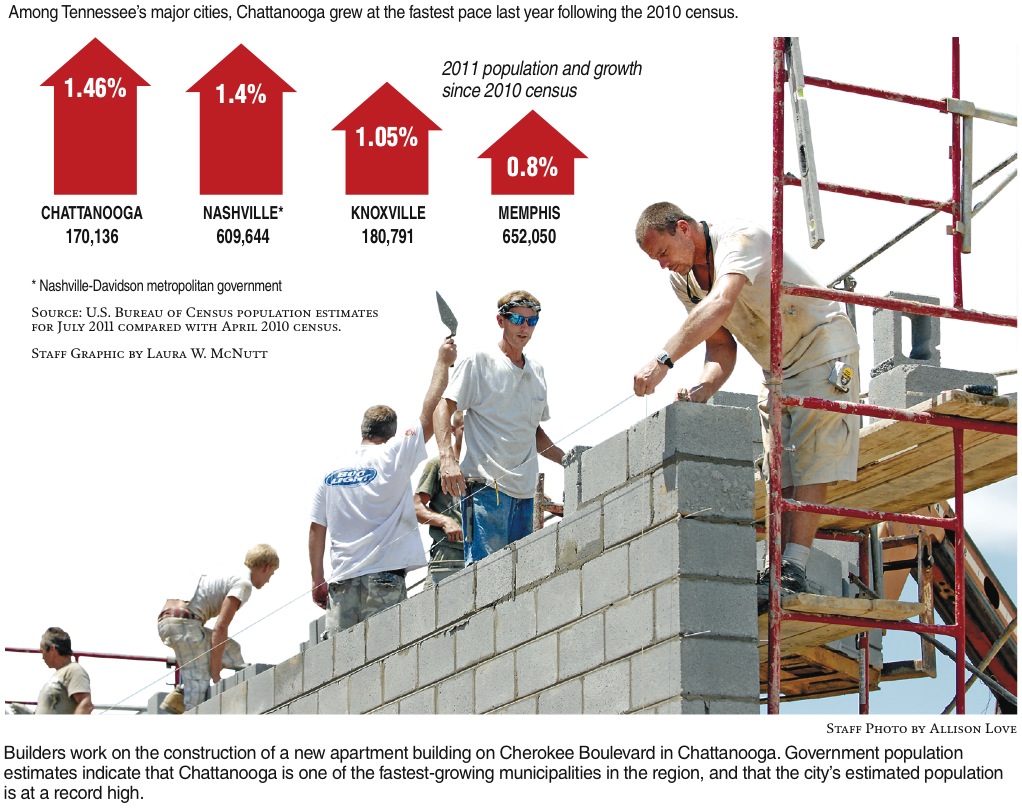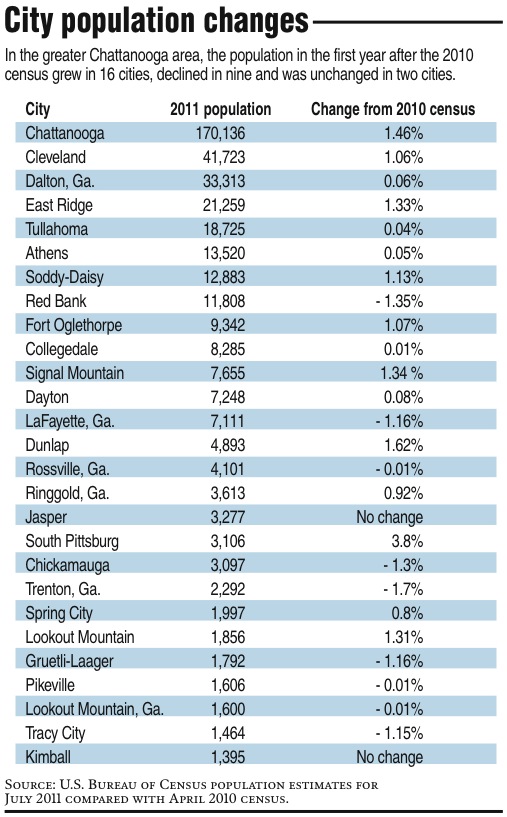ALSO READ
Former St. Barnabas Apartments under renovation for new tenants
When David and Beth Neuhoff moved to Chattanooga nearly a decade ago so David could take a corporate-level job with CBL & Associates Properties, they left the mountains of Boulder, Colo., for a lakefront house at Eagle Bluff in Harrison.
"We bought a great 4,600-square-foot house on Chickamauga Lake," Beth Neuhoff said. "But with our kids at Baylor School and my interest in the arts, most everything we did in Chattanooga was downtown."
So two years ago, the Neuhoffs decided to downsize and moved into the city, buying a condominium on Main Street.
"Now we walk to local restaurants and watch the sunset over the downtown skyline from our deck at night," Beth said.
The Neuhoffs are part of a return to the city by former suburban home-owners and young people eager to replace the space and comfort of smaller towns by living in more dynamic and pedestrian-friendly urban areas.
After decades of fleeing to the suburbs, new government population estimates indicate a growing number of Chattanoogans are returning to the city, making Chattanooga one of the fastest-growing municipalities in the region. Chattanooga even outpaced Tennessee's other major cities in its growth rate since the 2010 census, according to new estimates by the U.S. Bureau of Census.
"It's been a long time coming, but Chattanooga has achieved cool status," Chattanooga Mayor Ron Littlefield said. "I always knew we had a lot of untapped potential, and thanks to some new investments, the fastest Internet and a beautiful city, our young people are staying here and others are moving back."
The U.S. Bureau of Census estimates Chattanooga added 2,158 residents last year, pushing the city's estimated population to a record high of more than 170,000.
Chattanooga was the fastest-growing city last year among Hamilton County's 10 municipalities, census figures indicate.
Reversal of Fortune
The Scenic City, which shed more than 10 percent of its population during the 1980s and '90s, has finally overcome its population losses. Before World War II, three of every four residents in Hamilton County lived in Chattanooga, even though the city was only half the size it is today.
Most residents of Hamilton County still live outside Chattanooga, but the city's share edged up last year for the first time since the 1970s when it nearly doubled its size through annexations.
Chattanooga's estimated 2011 population of 170,136 is only 10,665 behind the population of Knoxville, currently the biggest city in East Tennessee and the state's third-largest city.
"When Gov. [Bill] Haslam was still mayor of Knoxville, I used to send him notes saying he was about to become mayor of the fourth-largest city in Tennessee because we are going to become the third biggest," Littlefield said.
Urban renaissance
But Chattanooga is not alone among urban cities growing faster than most of their suburbs. The Bureau of Census estimates that population gains last year were bigger in cities than in metropolitan suburbs for the first time since before World War II. As crime rates have dropped in the city and commuter costs and time have grown for those living in the suburbs, many residents are shifting back to urban areas.
"If you live in the suburbs, unless you own a dry cleaning store or work at a supermarket, you're going to commute to work, and given rising energy costs and traffic congestion, that's getting more costly for a lot of people," University of Georgia demographer Doug Bachtel said. "There are some strong factors encouraging more people to move back or chose to live in the city."
Among the biggest metro areas in America, a majority had faster growth in the city centers than in outlying suburbs during 2011. In the previous decade, only 10 percent of the biggest metro areas had faster growth in their urban cores.
Chattanooga's Appeal
Chattanooga has benefited by its renovated waterfront and downtown attractions, along with the addition of major employers such as Volkswagen, Alstom and Amazon in the past five years. With EPB's fiber-optic telecom service offering the first citywide gigabit-per-second Internet speeds, Chattanooga has recruited eight teams of technology startups this summer from around the world. The web developers are developing new business plans, and the most promising ones will be dividing $300,000 in Gig prize money.
Many such mobile entrepreneurs are being drawn to revitalized urban neighborhoods, including Chattanooga's Southside and Highland Park.
"There's something about living in a home with history that is gratifying, and it's less than a mile from where I work," said Aaron Rauch, 29, who bought a house in Highland Park with his 26-year-old wife, Sara. "We like the idea of our kids growing up around a downtown energy with more of a multicultural aspect going on."
With less pollution and crime and more restaurants and "greenway" walking paths in the city, Chattanooga's urban core is more attractive than it was in either the 1960s or the 1980s when many fled to the suburbs.
Renting more, buying less
Chattanooga also may be benefiting by the recession-induced decline in home sales in suburbia.
"With fewer people buying homes, there is a lot more demand for apartments," said Chattanooga developer John Wise, who has built or is now developing nearly $50 million in apartments, primarily in North Chattanooga.
"I'm as busy now as I've ever been," Wise said. "There's been a major turnaround downtown and the North Shore over the past 20 years, and people definitely want to live in these areas now."
Wise, who is completing the 280-unit Hayden Place on Pineville Road this year, just began another 24 apartments atop a first-floor commercial development at 125 Cherokee Blvd. known as the Constance. Wise is planning another 42 apartments on North Market Street.
Chattanooga Realtor Darlene Brown, who has been selling or leasing downtown units for more than a decade, said more apartments are needed downtown.
"If I had 50 rentals, I could have them all gone in 30 days," she said.
Even retirees are moving back into the city.
Spencer McCallie III and his wife, Sarah, built a house on Chickamauga Lake in Harrison after McCallie retired in 1999 from the school founded by his grandfather. But last September, they bought one of the new Walnut Hills condominiums downtown to replace their lakefront home.
"It was a 45-minute trip from our old house to see evening shows or other activities, so we decided at our age it's just a lot easier and better to live in the city," McCallie said.


